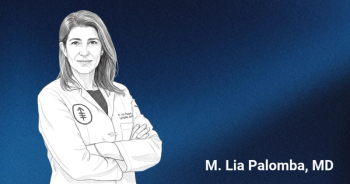
Study GO29365 in Relapsed-Refractory DLBCL
Matthew J. Matasar, MD:The data that led to the FDA approval of the combination of bendamustine, rituximab, and polatuzumab vedotin come from the trial that was known internally at Genentech, Inc, as GO29365.
This was a trial evaluating the use of bendamustine and rituximab [BR] with or without polatuzumab vedotin. The study actually had multiple arms, but the ones I’ll focus on for this conversation are beyond the study that’s used in diffuse large B-cell lymphoma in relapsed-refractory transplant-ineligible patients.
There was both a phase Ib expansion as well as phase II randomized data that came out of this trial. The data from the phase II randomized component that randomized 80 patients40 on each arm—to either receive BR [bendamustine, rituximab] alone or BR [bendamustine, rituximab] in combination with polatuzumab vedotin-[piiq], demonstrated significant improvement in the important end points for the inclusion of polatuzumab in such patients. Here we had improved overall survival as well as complete response rate and progression-free survival [PFS] end points.
This was the first randomized trial to demonstrate an overall survival benefit for any therapeutic approach in relapsed-refractory large-cell lymphoma in the rituximab era. This is an important observation and an important study for this very reason.
What we saw is that there was significant improvement in survival for the polatuzumab vedotin plus BR [bendamustine, rituximab]treated patients compared with BR [bendamustine, rituximab] alone, with an overall survival of approximately a year versus approximately 4 months for the BR [bendamustine, rituximab] patients alone. PFS was similarabout 12 months for the treated patients, versus about 4 months for the BR [bendamustine, rituximab] control arm.
There was a subset of patients who received the polatuzumab vedotin-[piiq] and BR [bendamustine, rituximab]–based therapy who enjoyed significantly prolonged duration of response and duration of remission, with 20% of treated patients actually remaining in remission longer than 2 years. This is something we do not typically see happen for patients with relapsed-refractory large-cell lymphoma who are ineligible for stem cell transplant. How durable this response is, and how accurate an estimate that is of the durability will hopefully become clearer as the data continue to mature and as we gain real-world experience with this regimen.
Transcript edited for clarity.


















